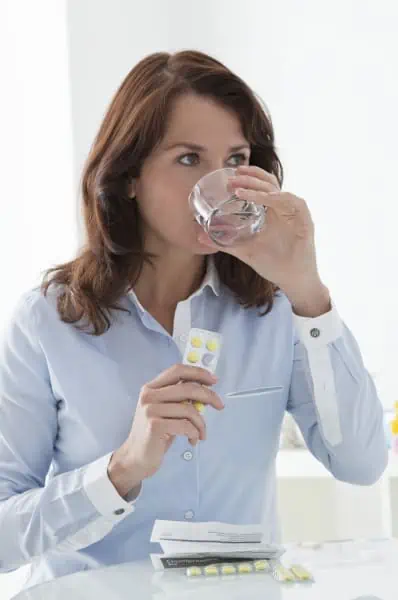Among all endocrine disorders, polycystic ovarian syndrome or PCOS may have the unusual distinction of being one of the 21st century’s silent epidemics – a title we usually reserve for infections. Current government estimates show up to 20% of all women may develop PCOS, making it one of the most burdensome women’s health issues. Moreover, this complex condition doesn’t have a starting point, just a cluster of symptoms that feed off each other.
A great example of this? The link between PCOS, depression, and anxiety. The disease by itself can bring about a lot of psychological distress, and at the same time, mood disorders make it all much harder to treat.

What is Polycystic Ovary Syndrome (PCOS)?
Polycystic ovary syndrome is not technically a disease but a group of symptoms that usually appear together in women of reproductive age and negatively affect their quality of life. Most of the symptoms of PCOS can be traced back, in one way or another, to hormonal imbalance. However, there is no clear “trigger” that sets off the condition.
Diagnosing PCOS
As we don’t have a single cause, the diagnosis of PCOS is usually done following the “Rotterdam consensus.” To meet these diagnostic criteria, women need to have at least two out of these three symptoms:
- Problems with ovulation (either as menstrual irregularities or periods where they don’t ovulate).
- Hyperandrogenism, or increased production of male hormones (androgens).
- The presence of many small cysts (fluid-filled sacs) in the ovaries.
Other symptoms of PCOS
The symptoms above don’t really convey PCOS’s impact on health-related quality of life. The cysts, for example, rarely grow or cause any discomfort, so they can go unnoticed for years. However, the other two symptoms can create various disruptions to your well-being.
Problems with ovulation, for example, do more than just disrupt menstrual cycles. They also tend to be accompanied by:
- more severe PMS symptoms
- painful periods (dysmenorrhea)
- frequently missed periods (amenorrhea)
- infertility or difficulty in conceiving
Meanwhile, excess androgen production can cause:
- changes in sex drive
- mood swings and increased aggression
- hirsutism (abnormal body hair growth)
- deepening of the voice
Finally, there’s insulin resistance(sometimes known as pre-diabetes). This is a separate health issue, but it’s closely linked to PCOS – even if experts are still unsure about which causes which.
Insulin resistance is when the body begins producing excess amounts of insulin to the point that it stops responding to it.
Insulin resistance usually causes high glucose levels and hard-to-reverse weight gain, which can easily turn into obesity (BMI over 30). When left unchecked, insulin resistance can give way to type 2 diabetes. It also puts you at an increased risk of cardiovascular disease and other health complications
With that said, not everyone with PCOS is overweight or has insulin resistance. However, PCOS is considered a predictor of insulin resistance, so even women at a healthy weight should check their insulin levels periodically.
How are PCOS and mental health linked?
Once again, we don’t completely know! While we know that PCOS patients have a higher prevalence of anxiety and depression than the general population, the causes behind both are contradictory.
So far, researchers believe that there are two simultaneous links between PCOS and depressive disorders. On one side, the stress of dealing with PCOS can make depression symptoms much worse. At the same time, hormonal imbalances may also trigger psychiatric disorders or make their symptoms worse.
Let’s take a close look at both camps in this debate.
Does PCOS cause depression?
In short, yes. If you have PCOS, “tired and depressed” may feel awfully familiar to you. The combination of weight issues and painful periods can easily increase stress levels – a known risk factor for depression.
For some patients, this can go a step further. Menstrual abnormalities can get in the way of fertility, which can bring about very painful feelings of inadequacy and trigger major depression.
Meanwhile, frequent weight problems and hirsutism can easily impact self-esteem and provoke severe problems with body image. As a result, adolescents with PCOS are at a higher risk of developing eating disorders than their peers, especially if they also have pre-existing depression and anxiety symptoms.
So far, this is bad news for people who already have depression or are at least prone to it and then develop PCOS. But hormonal imbalance – especially hyperandrogenism – can also contribute to depression, as they correlate with higher levels of cortisol, a stress hormone that contributes to depression.
Unfortunately, psychiatry hasn’t discovered a single cause of depression or anxiety disorder either – so we can’t ever say for sure that someone’s low moods are caused solely by PCOS.
Is depression making my PCOS worse?
Here, the link is slightly less obvious. Many psychiatric disorders cause changes in weight and appetite. In the case of depression, this usually presents itself as less energy and either a smaller or larger appetite. As a result, many people with depression gain weight, which can set off insulin resistance and worsen the symptoms of PCOS.
Managing and treating PCOS and depression
Both depression and PCOS are notoriously tricky to treat, even when they don’t appear together: they both require a combination of approaches to disappear completely, alongside some degree of trial-and-error.
Will treating PCOS make depression go away?
So far, most large studies and systematic reviews show that PCOS will, at least, feed into depression. Therefore, many women expect their depressive symptoms to disappear once they begin tackling their hormonal symptoms. However, major depressive disorder is stubborn, and while some improvement usually follows PCOS treatment, there’s no guarantee that it will go away completely.
Standard interventions for PCOS
The regular management of polycystic ovary syndrome includes a combination of hormone-regulating medications and lifestyle changes.

On the medication side, some of the most widely-used options are:
- Metformin, an anti-diabetes medication that can also help with insulin resistance.
- Birth control pills to diminish hormone fluctuations.
- Flutamide or spironolactone, which lower the body’s absorption of male hormones.
Meanwhile, lifestyle changes usually focus on weight loss and blood glucose control. We have a separate article devoted to this, so to keep it short: you want to burn some extra calories and prioritize low-sugar, high-fiber, and high-protein foods.
And here’s where priorities can get tricky again.
Although birth control is usually the cheapest way to regulate hormones, it can also hurt psychiatric symptoms. Hormonal birth control pills can increase symptoms of anxiety, mood swings, and irritability. Plus, some types of “combination birth control” can also increase your chances of developing depression for the first time.
As for lifestyle changes? For someone currently battling moderate or severe depression, a complete revamp of their schedule may need to wait a bit. It takes a lot of energy to be depressed but even more energy to get better, making it harder to add a new exercise program, meal prep, and healthier choices to one’s schedule.
Combating depression and anxiety
The gold standard for treating depression and anxiety is a combination of talk therapy (cognitive-behavioral therapy) and antidepressant medication.
The main hurdle is that antidepressants and PCOS don’t always mix well. Some popular options, such as selective serotonin reuptake inhibitors or SSRIs (like Prozac or Zoloft), can occasionally increase appetite and make weight loss harder.
Currently, the best antidepressant for PCOS and depression is Contrave, a combination of bupropion (which tackles moods) and naltrexone (which seems to help with weight loss).
For PCOS and depression, compassionate care with Dr. Aliabadi works best
As they are closely linked, PCOS and depression should not be treated independently by doctors without contact with each other – but you also don’t need to chase an elusive psychoneuroendocrinology expert.
Both are chronic conditions that refuse to follow a “one size fits all” approach and depending on the patient, one may need to take priority over the other. This is where the help of a compassionate doctor who sees health care as a holistic issue can make all the difference.
Dr. Thais Aliabadi is a board-certified obstetrician and gynecologist with a distinct patient-centered care philosophy. At her team, each PCOS patient is seen wholly and can become an active agent in their long-term care. Through partnerships with other healthcare providers and her brand of empathy, she can help direct a multidisciplinary team that can combat depression, minimize hormonal dysfunction, and even treat other companion issues like infertility.
Make an appointment online or call (844) 863-6700 to establish care with Dr. Aliabadi.
The practice of Dr. Thais Aliabadi is conveniently located for patients throughout Southern California and the Los Angeles area. We are near Beverly Hills, West Hollywood, Santa Monica, West Los Angeles, Culver City, Hollywood, Venice, Marina del Rey, Malibu, Manhattan Beach, and Downtown Los Angeles.
References
Cooney LG, Dokras A. Depression and anxiety in polycystic ovary syndrome: etiology and treatment. Curr Psychiatry Rep. 2017;19:83.
Deeks AA, Gibson-Helm ME, Paul E, Teede HJ. Is having polycystic ovary syndrome a predictor of poor psychological function including anxiety and depression? Hum Reprod. 2011;26:1399–407.
Quinn M, Shinkai K, Pasch L, Kuzmich L, Cedars M, Huddleston H, et al. Prevalence of androgenic alopecia in patients with polycystic ovary syndrome and characterization of associated clinical and biochemical features. Fertil Steril. 2014;101:1129–34.















